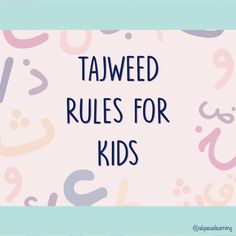Table of Contents
- 1 Tajweed for kids
- 2 What are tajweed rules
- 3 Teaching Tajweed to kids
- 4 What is the reward of reading Quran with Tajweed?
- 5 How Do I Teach My Kid Tajweed
- 6 How can I make Tajweed practice more engaging for my child?
- 7 Is tajweed rules important for kids?
- 8 Best Age To start Learning Tajweed For Kids
- 9 Importance of Tajweed for Kids
- 10 How to start learning Tajweed For Beginners
Tajweed for kids
What are tajweed rules
Tajweed rules are a set of guidelines that govern the proper pronunciation and intonation of the Quranic text. The rules cover areas such as pronunciation, intonation, and lengthening of vowels. Here are some examples of rules of Tajweed:
1. Makharij: The correct pronunciation of each Arabic letter is essential to recite Quran with proper Tajweed. The makharij (articulation points) refer to the correct points of the mouth and throat where each letter is pronounced.
2. Sifaat: The sifaat (attributes) refer to the characteristics of each letter, such as its heaviness or lightness, the way it is pronounced, and whether it is pronounced with vibration or not.
3. Ghunna: Ghunna is the nasalization of some letters, such as the letter noon (ن) and meem (م), which require a slight nasal sound when pronounced.
4. Madd: Madd refers to the lengthening of vowels. Some vowels can be elongated, and proper Tajweed requires that they be pronounced with the correct length.
5. Qalqalah: Qalqalah refers to the slight vibration or bounce of some letters when they are pronounced. There are five letters that have qalqalah: qaf (ق), ta (ط), ba (ب), jeem (ج), and dal (د).
These are just a few examples of the Tajweed rules. There are many more rules that cover various aspects of Quranic recitation. Learning and applying these rules is essential for reciting the Quran with proper Tajweed.
Teaching Tajweed to kids
it can be quite simple and fun if you use an engaging and age-appropriate approach. Here are some tips and a step-by-step guide to teaching Tajweed basics to kids.
1. Start with the Arabic alphabet
Before diving into Tajweed rules, it’s essential to make sure the child is familiar with the Arabic alphabet. Use visual aids like flashcards, posters, or Arabic alphabet songs to help the child memorize the letters and their shapes.
2. Teach the basic pronunciation rules
Introduce the basic pronunciation rules for each letter, focusing on the correct articulation points (makharij) and characteristics (sifaat) of each letter. Start with simple letters like ا, ب, ت, and progress to more complex ones.
3. Teach the basic Tajweed rules
Once the child is comfortable with the Arabic alphabet, you can start introducing basic Tajweed rules, such as:
– Nun sakinah and tanween rules: Teach the rules of idgham, ikhfa, and iqlab.
– Madd (elongation) rules: Explain the types of madd (like madd al-asli, madd al-far’i) and when to apply them.
– Qalqalah (echo) rule: Teach when and how to apply the qalqalah sound to letters ق, ط, ب, ج, and د.
– Rules of ra and lam: Explain the rules for pronouncing ر and ل in different situations.
4. Practice with examples
Choose short, age-appropriate verses from the Quran to practice the Tajweed rules you’ve taught. Start with simple verses and gradually progress to more complex ones. Encourage the child to recite the verses aloud and correct any mistakes they make.
5. Encourage consistency and patience**
Tajweed requires consistent practice over time. Encourage the child to practice regularly and remind them that learning Tajweed is an ongoing process. Be patient and supportive, offering praise and rewards for their efforts.
6. Consider enrolling them in a class or finding a tutor**
If you’re not confident teaching Tajweed yourself, consider enrolling the child in a class or finding a qualified tutor. in Ehsan Academy, we assure the quality of teaching our kids in our online Quran recitation course
Remember that every child learns differently, so adapt your teaching style to suit their needs and preferences. With patience, consistency, and encouragement, kids can learn Tajweed and develop a strong foundation in Quranic recitation.
What is the reward of reading Quran with Tajweed?
Reciting the Quran with proper Tajweed is considered a great act of worship in Islam, and there are many rewards associated with it. Here are some of the rewards of reading Quran with Tajweed:
Increased Reward: The reward for reciting Quran with Tajweed is multiplied compared to reciting without Tajweed. This is because Tajweed requires more effort and attention to detail.
Understanding of the Quranic Message: Reciting Quran with Tajweed helps to enhance the understanding of the Quranic message. Proper pronunciation and intonation can help to convey the intended meaning of the Quranic verses.
Spiritual Connection with Allah: Reciting Quran with Tajweed helps to deepen the spiritual connection with Allah. The Quran is considered the word of Allah, and reciting it with proper Tajweed can help to strengthen the bond between the reciter and Allah.
Protection from Satan: Reciting Quran with proper Tajweed can also protect the reciter from Satan. Satan is known to be repelled by the recitation of Quran, and reciting with Tajweed can make the recitation even more powerful.
Intercession on the Day of Judgment: It is believed that those who recite Quran with Tajweed will be granted intercession on the Day of Judgment. This means that they will be granted forgiveness and mercy from Allah.
Overall, reciting Quran with proper Tajweed is a highly rewarded act of worship in Islam. It helps to enhance the understanding of the Quranic message, deepen the spiritual connection with Allah, and bring numerous other benefits and rewards.
How Do I Teach My Kid Tajweed
Teaching Tajweed to children can be a rewarding experience. Here are some steps you can take to teach your kid Tajweed:
Start with the basics: Begin by teaching your child the Arabic alphabet and the basic sounds associated with each letter. You can use flashcards or other materials to help them learn the sounds of each letter.
Practice regularly: Regular practice is essential for learning Tajweed. Make sure to set aside time each day to practice with your child. You can use Quranic verses or other materials to help your child practice.
Use audio resources: Use audio resources such as Quranic recitations or Tajweed tutorials to help your child hear the correct pronunciation and learn the rules of Tajweed.
Be patient: Tajweed can be challenging, especially for kids. Be patient and encourage your child to keep practicing.
Seek professional help: Consider hiring a Quran tutor or enrolling your child in a Tajweed class to provide targeted support and exercises to help your child improve.
Lead by example: Lead by example by reciting Quran yourself and showing your child the importance of proper recitation. Encourage your child to recite Quran regularly and praise their efforts.
How can I make Tajweed practice more engaging for my child?
Here are some tips to make Tajweed practice more engaging for your child:
1. Use visual aids: Use visual aids such as charts, posters, or diagrams to help your child understand the rules of Tajweed. You can make them colorful and interactive to make it more engaging.
2. Incorporate games: Make learning Tajweed fun by incorporating games, puzzles, or other interactive activities. For example, you can play a game where your child has to identify the Tajweed rule being applied in a particular recitation.
3. Use technology: Use technology to make Tajweed practice more engaging. You can use some videos Quranic recitation apps or online Tajweed courses that are designed for kids.
4. Make it a family activity: Involve the whole family in Tajweed practice. You can have family Quran recitation sessions or compete with each other to see who can recite Quran with proper Tajweed.
5. Use rewards: Use rewards to motivate your child. You can offer small rewards for completing a certain number of practice sessions or for achieving a particular goal.
6. Be creative: Be creative in your approach to Tajweed practice. You can use storytelling, role-playing, or other creative techniques to make learning more engaging.
Remember to be patient and encouraging with your child. Tajweed can be challenging, but with the right approach, it can also be a fun and rewarding experience for your child.

Is tajweed rules important for kids?
Yes, Tajweed rules are important for kids who are learning to recite the Quran. Tajweed is the set of rules that governs the proper pronunciation and intonation of the Quran, and it is essential for the accurate and beautiful recitation of the Quran.
Learning Tajweed rules helps kids to recite the Quran with proper pronunciation, which is crucial for understanding the meaning of the Quranic verses. Proper Tajweed also helps to preserve the beauty and integrity of the Quranic text, which is considered the most important book in Islam.
Moreover, learning Tajweed rules in Quran can also help kids to develop a deeper connection with the Quran and Islam. It can also help to instill a sense of discipline and focus, as Tajweed requires concentration and attention to detail.
Overall, teaching Tajweed rules to kids is an important part of their Islamic education, and it can have a positive impact on their spiritual and personal development.
Best Age To start Learning Tajweed For Kids
The best age to start learning Tajweed for kids is around 7 years old when they have already learned basic Arabic reading and writing skills. At this age, children are able to understand the concepts of Tajweed and can start practicing the rules.
However, it is never too early or too late to start learning Tajweed. Some parents start teaching their kids Tajweed as early as the age of 5, while others start later. The important thing is to make sure that the child is ready and interested in learning.
It is also important to note that Tajweed is a lifelong learning process. Even adults who have been reciting the Quran for years can benefit from learning Tajweed rules to improve their recitation and deepen their understanding of the Quranic text.
In summary, the best age to start learning Tajweed for kids is around 7 years old, but it is never too early or too late to start. The most important thing is to make sure that the child is ready and interested in learning and to provide them with the necessary resources and support to help them succeed.
Importance of Tajweed for Kids
- Importance of Tajweed: Tajweed is an essential part of reciting the Quran with accurate pronunciation and proper intonation. It helps to preserve the integrity and beauty of the Quranic text and enhances the understanding and connection to the message of the Quran.
- Learning approach: Tajweed can be a challenging subject, especially for kids. It is important to use a systematic and gradual approach that starts with the basics and gradually builds up to more advanced concepts. The learning approach should also be engaging and interactive to maintain the child’s interest and motivation.
- Resources: There are numerous resources available to help kids learn Tajweed, including books, videos, online courses, and Quran tutors. It is important to choose resources that are age-appropriate and aligned with the child’s learning style and level.
- Practice: Regular practice is critical for learning Tajweed. Parents should set aside time each day for the child to practice reciting Quranic verses with Tajweed rules. It is also beneficial to practice with a Quran tutor or in a group setting to receive feedback and guidance.
- Patience and encouragement: Tajweed is a lifelong learning process, and it requires patience and encouragement from parents and tutors. Parents should recognize and praise the child’s efforts and progress, and provide positive reinforcement to keep them motivated.
- Proper Quranic Recitation: Tajweed ensures that kids recite the Quran with proper pronunciation and intonation. This is important for understanding the meaning of the Quranic verses and developing a connection with the Quran.
- Preservation of the Quranic Text: Tajweed helps to preserve the integrity and beauty of the Quranic text. By reciting the Quran with Tajweed rules, kids can ensure that the Quranic text is recited in the way it was revealed to Prophet Muhammad (peace be upon him) and passed down through generations.
- Spiritual Development: Tajweed helps to deepen kids’ spiritual connection with the Quran and with Allah. Reciting the Quran with proper Tajweed rules can help to enhance their understanding and appreciation of the Quranic message and develop their sense of faith and spirituality.
- Cognitive Development: Learning Tajweed requires concentration, attention to detail, and discipline. Practicing Tajweed can help to develop kids’ cognitive skills and improve their memory and focus.
- Cultural Identity: Tajweed is an integral part of Islamic culture, and learning Tajweed can help to strengthen kids’ cultural identity and sense of belonging to the Muslim community.
Overall, learning Tajweed is an important aspect of Islamic education for kids. It can help to develop their Quranic recitation skills, deepen their spiritual connection, enhance their cognitive skills, and strengthen their cultural identity.
How to start learning Tajweed For Beginners
If you are a beginner and want to learn Tajweed, here are some steps you can take:
- Learn the Arabic Alphabet: The first step in learning Tajweed is to learn the Arabic alphabet and the basic sounds associated with each letter. You can use flashcards or other materials to help you learn the sounds of each letter.
- Understand the Rules of Tajweed: Once you are familiar with the Arabic alphabet, start learning the rules of Tajweed. Tajweed rules cover areas such as pronunciation, intonation, and lengthening of vowels.
- Practice Regularly: Regular practice is essential for learning Tajweed. Make sure to set aside time each day to practice reciting Quranic verses with Tajweed rules.
- Seek Professional Help: Consider hiring a Quran tutor or enrolling in a Tajweed course to provide targeted support and exercises to help you improve.
- Be Patient: Tajweed can be challenging, especially for beginners. Be patient and keep practicing.
- Recite Quran Regularly: The best way to improve your Tajweed skills is to recite Quran regularly. Make it a habit to recite Quran daily with proper Tajweed rules.
In summary, learning Tajweed for beginners requires learning the Arabic alphabet, understanding the rules of Tajweed, using visual aids, practicing regularly, seeking professional help, being patient, and reciting Quran regularly with Tajweed rules.







